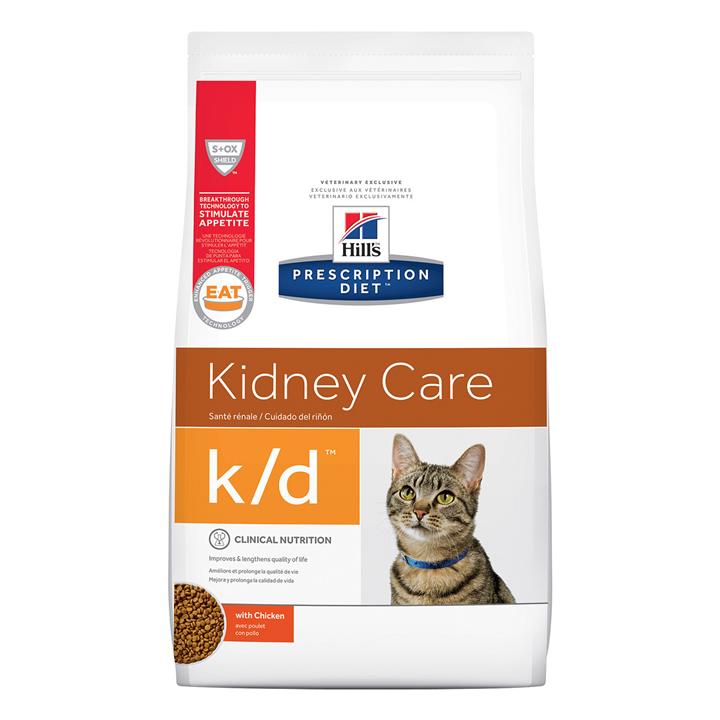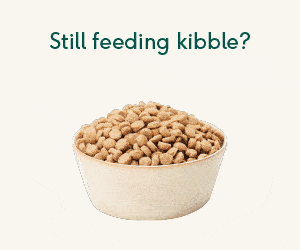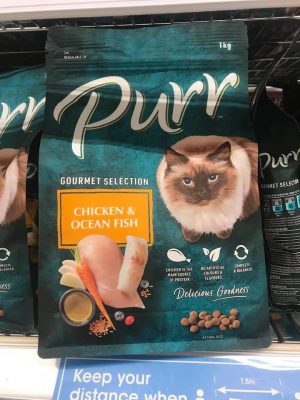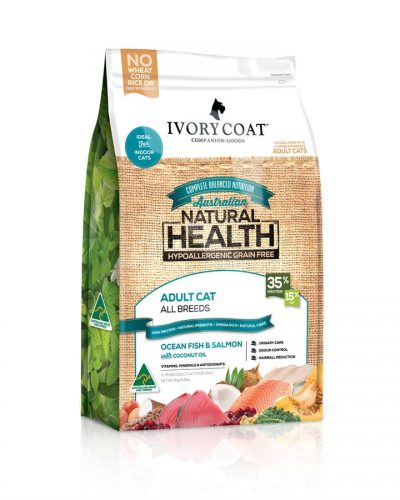
When 1 in 3 cats will be diagnosed with kidney problems or CKD (Chronic Kidney Disease) in their lifetime, it’s no wonder you’re here reading this review.
Your cat’s been diagnosed, and your vet has likely recommended Hill’s Prescription Diet Kidney Care (k/d) in the hope of keeping your cat in the best health possible.
You’re probably here to find out if that’s true, but as you read this review you’ll probably learn some harsh truths. Please don’t feel bad though, as I went through the same with my first cat Rodney 20 years ago.
Let’s find out the truth about Hill’s Prescription Diet and how it may support kidney health in your cat:
Hill’s Prescription Diet Kidney Care (k/d) for cats
What the marketing says
Caring for your cat’s kidneys should start when they’re a kitten, but unfortunately we have the wool pulled well and truly over our eyes for one simple reason – pet food marketing.
On the packaging of Hill’s Prescription Diet Kidney Care dry food we find the words “VETERINARIAN RECOMMENDED” in bold letters. We also find claims like “CLINICAL NUTRITION”, “THERAPEUTIC CAT NUTRITION”, and “S+OX SHIELD” whatever that means.
You’ll also find some French, something about an “Enhanced Appetite Trigger” or “E.A.T”, and a cute cat. They also say “With Chicken”, which according to the Australian Standard for Manufacturing and Marketing of Pet Food means somewhere between 5% and 20% of the formula.
But what does all this really mean?
A cat, by definition, is an obligate carnivore. Meat eater through and through.
Let’s take a look at how “carnivorous” the ingredients of this cat food are, but let the following quote sink in first:
Cats are desert animals. In their native environment the source of moisture available to them is from their diet – prey animals – particularly from the intestines and kidneys. This is why drinking from a bowl is unnatural for a cat. Domestic cats fed dry food will often suffer from a lack of moisture intake, as a precursor to renal failure.
An Australian certified pet nutritionist (name redacted).
When you consider these essential facts, it may make you wonder if dry food was the cause of their current kidney problems in the first place. Or whether a dry food labelled “Kidney Care” is the real remedy?
What the ingredients really say?
Chicken is the first ingredient.
Sounds great, doesn’t it?
But, remember I mentioned the with word meaning 5% to 20%? That means the next ingredients will likely be most of the food, and that matters.
What we find in Hill’s Prescription Diet Kidney Care for cats is brown rice, corn gluten meal, and whole grain wheat. That’s not the last of the grains either, with more inclusions of brewers rice, wheat gluten, and soybean oil.
Ask your vet if they think grains are good for cats.
In fact, this cat food has 38.2% carbohydrates listed on the label, which will mostly come from the wheat and rice. The protein will be inflated with corn, which doesn’t seem ideal for a meat-eating cat.
For a brand marketed as a veterinarian-endorsed or “science diet”, have they forgotten the true nature of the animal they’ve designed this food for?
To make matters worse, these grains are cooked into a fairly moisture-less dry kibble, supposedly to support your cat’s kidneys!
It makes you wonder why vets recommend such a brand, even if it does make them a lot of money.
The best argument I’ve heard from vets over the years is they’ve seen this cat food work. But the real question is why, and my best guess is because the previous cat food was worse.
Yes, there’s additives in the food to support your cat’s kidneys, but the truth is you’re feeding your carnivorous cat a laundry list of grains.
Surprised?
My first cat was diagnosed with early stages of renal failure, and on my vet’s recommendation we fed him this food until he passed away. He withered away long before that though, and I had to medicate him to the eyeballs and extract poo from his anus. Poor guy.
If I were you I’d opt for a diet with significantly more meat, preferably with organs too, and definitely more moisture. A cat water fountain may be a good investment, but why not feed them a carnivorous diet with natural moisture instead? Raw, wet, or fresh foods will likely be better.
I hope this review helps you make a choice for your cat which really leads to better health.
I don’t ask much in return, but if this review has helped, or helps your cat, please take 30 seconds to leave me a positive review on Google – this really helps support this website! You can leave a review here.
Questions on a postcard (or in the comments section below).
If you’re determined to feed a Hill’s Prescription Diet for kidney care, then I urge you to feed the wet canned variety. It’s much more appropriate for a cat with kidney problems.
Where to buy
Ingredients
Ingredients of Hill’s Prescription Diet Kidney Care (k/d) cat food:
Chicken, Brown Rice, Corn Gluten Meal, Whole Grain Wheat, Chicken Fat, Brewers Rice, Pea Protein, Chicken Liver Flavor, Powdered Cellulose, Egg Product, Wheat Gluten, Soybean Oil, Fish Oil, Lactic Acid, Calcium Sulfate, Potassium Citrate, L-Arginine, Calcium Carbonate, L-Lysine, Choline Chloride, DL-Methionine, L-Threonine, vitamins (Vitamin E Supplement, Niacin Supplement, L-Ascorbyl-2-Polyphosphate (source of Vitamin C), Thiamine Mononitrate, Pyridoxine Hydrochloride, Calcium Pantothenate, Riboflavin Supplement, Biotin, Vitamin A Supplement, Vitamin B12 Supplement, Folic Acid, Vitamin D3 Supplement), Taurine, Potassium Chloride, Iodized Salt, minerals (Ferrous Sulfate, Zinc Oxide, Copper Sulfate, Manganous Oxide, Calcium Iodate, Sodium Selenite), L-Carnitine, L-Tryptophan, Mixed Tocopherols for freshness, Natural Flavors, Beta-Carotene.
Guaranteed analysis
Guaranteed analysis of Hill’s Prescription Diet Kidney Care (k/d) cat food:
| Protein | 29.5% |
| Fat | 23.7% |
| Crude Fibre | 3.2% |
| Carbohydrates * | 38.2% |
* May be estimated. Read how to calculate carbohydrates in a pet food.








you should not be giving people advice on this particular food, this food help my cat to lower her creatinine significantly and improve other values in her blood work.
it does make difference
Hi Miriam,
Yes, but for how long?
You may find the following interesting – Why do vet’s recommend Hill’s Science Diet / Prescription Diet.
Yes I believe all of this, this wheat etc doesn’t nothing for a cat.
But what is a budget way if feeding them?
Hi Karyn, between you and I (and anyone else reading this comment!) I would consider fresh foods – meat, fish, organs, meaty bones – a better budget way of feeding a cat than a processed product made of grains. Often meat, organs, and bones can be bought very cost efficiently, and it can be part of the diet at the least.